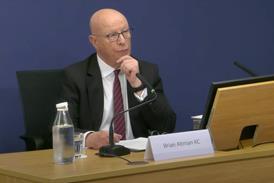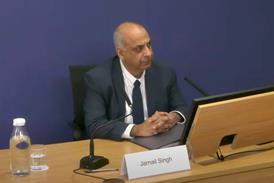The Ministry of Justice is considering restricting litigators from instructing advocates within the same firm as part of proposals to enhance the quality of criminal advocacy.
In a consultation opening today, the MoJ says it is looking at proposals to prevent a conflict of interest when litigators advise clients on the choice of advocate.
The consultation says: ‘There is a line of argument that restricting the ability of defence firms to instruct in-house advocates in publicly funded criminal cases would reduce the influence of financial incentives on choice of advocate.
‘It would be possible to explore ways in which instructing in-house advocates could be restricted.’
The consultation also suggests requiring litigators to make clients aware if an advocate is employed in-house.
The consultation also suggests that the Legal Aid Agency’s standard contracts could be amended ‘to better reflect the obligation of litigators to provide impartial advice to clients on their choice of advocate’.
Solicitors reacted coolly to the proposal. Bill Waddington, chair of the Criminal Law Solicitors’ Association, said: ‘Hundreds of firms have bid for [legal aid] contracts on financial terms that incorporated the instruction of properly qualified and suitable "in-house" advocates. In fact the viability of many firms' bids rely upon the ability to do so. This finely balanced financial calculation is immediately put at risk in this document.'
Jonathan Black, president of the London Criminal Courts Solicitors’ Association, said: ‘There appears to be a view that dual contracts are not a concern for the bar as long as solicitor-advocacy is curbed. We have warned that this has been a priority for some for a long time.
‘It’s time for the bar to focus their concern towards the MoJ’s attack on fees than solicitors. It is a symptom of the behind the scenes negotiations that have been going on for sometime. We urge all solicitors to respond and let the MoJ know the true position which is far different to the anecdotal evidence heard over cosy chats.’
Other proposals highlighted in the consultation including introducing a publicly funded panel scheme for criminal defence advocates, similar to the Crown Prosecution Service’s advocacy panel scheme.
Catherine Dixon, chief executive of the Law Society, said: ‘We are supportive of a consistent level of high quality advocacy. We were anticipating that this would be achieved through the introduction of the Quality Assurance for Advocacy Scheme. We will study the proposals carefully and will wish to ensure that there is no duplication or unnecessarily burdensome regulation resulting from these proposals, especially in light of recent significant fee reductions.’
The government is also consulting on whether to introduce a statutory ban on criminal referral fees, and is asking for views on how to identify and prevent disguised referral fees.
Both the Solicitors Regulation Authority and the Bar Standard Board pointed out that referral fees are already barred by regulators. The government said that it is considering making the ban statutory in response to reports that referral fees are still frequently paid and received.
Alistair MacDonald QC, chairman of the Bar Council, said: ‘We have been calling for an effective ban on referral fees for some time. We welcome these proposals to preserve and enhance the quality of criminal advocacy, for which we have and others have been calling for some time.
‘We shall study the proposals very carefully including the proposal to introduce a panel for publicly funded advocacy. Any such panel will need to be independent of government if it is to satisfy the public interest and command the support of the legal profession. ‘The bar will be constructively engaged in the consultation on these important proposals.’
Justice minister Shailesh Vara said: 'This government is determined to ensure we continue to have vibrant and effective advocacy in our courts. That is why we cancelled proposed cuts to criminal legal aid for barristers earlier this year, and today we are going further.
'The payment of referral fees to secure instruction is unacceptable – which is why we want to change the law in order to tackle this issue. The guiding principle in advising clients on their choice of advocate must always be the competence and experience of the advocate - rather than their willingness to pay a referral fee.'

























29 Readers' comments